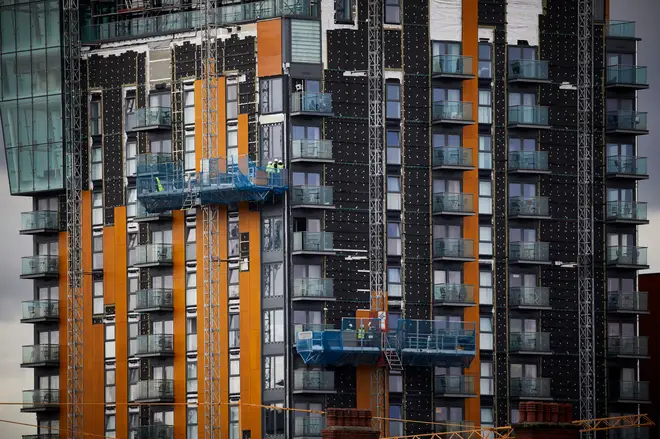
Ben Kentish 10am - 12pm
12 November 2021, 19:42 | Updated: 15 November 2021, 05:16

House-builders may be "gaming the system" to avoid having to adhere to fire safety regulations put in place as a result of the Grenfell Tower tragedy, a fire chief has warned.
For example, buildings may be built shorter than 18 meters as those that are taller than that are considered "high-rise" and therefore require more advanced safety measures, according to assistant commissioner of the London Fire Brigade (LFB) Paul Jennings.
"We have got examples where we think people are deliberately designing and building their buildings below that 18 metre, six floor threshold because they know if they reach that threshold they would have to put advanced and more intricate fire safety measures in," he told the BBC.
The assistant commissioner described these new buildings in the UK capital as examples where there "may be gaming the system".
He warned: "We are potentially extending the legacy issues that we are already currently discovering that are in London and in the cities across the country."
Read more: Grenfell Tower 'set to be demolished' more than four years after 72 died in fire
Read more: Lawyer facing £70k cladding removal bill could go bankrupt and lose her job if told to pay
When asked how many new buildings in London were being constructed to avoid the rules, he said it was likely "hundreds and if not thousands".
"We are seeing around 60% of the building consultations that come into the fire engineering team and others are ones where we are going backwards," added Mr Jennings.

Steph Pike is facing 70k fine and possible bankruptcy over cladding
The London Fire Brigade's warning comes after the Housing Secretary, Michael Gove, made his first appearance in front of a committee of MPs who asked questions about building safety.
On Monday, Mr Gove told the Housing, Communities and Local Government Committee: "We collectively - the department, some in local government, others in the private sector - failed people at Grenfell and there are people who were and still are in buildings where there is a significant risk."
He went on to say that, as the Grenfell Inquiry turned its attention to the Government's role in the disaster, his department "will be seen to have, on a couple of occasions, not necessarily appreciated the importance of fire safety".
Read more: Cladding crisis: Exhausted leaseholders to protest outside Parliament today
Read more: Government 'erasing memory of Grenfell for convenience', Maajid Nawaz fears
Asked about who should pay for the work required to make the affected buildings safe, Mr Gove confirmed that he would "pause" plans that would see leaseholders take out loans to pay for remediation work.
Some leaseholders have reportedly been hit with bills for more than £100,000 to replace unsafe cladding or pay for so-called "waking watches" where someone is employed to patrol a building checking for fires.

Sadiq Khan on New Providence Wharf Fire and cladding
The Housebuilders Federation, which represents housing developers, told Newsnight: "Developers meet the building regulations set by Government without exception.
"Standards today are considerably more exacting than previous iterations. Building regulations differ dependent on the type of building, but all have residents safety at their core."
The Government said: "The safety and wellbeing of residents is our priority and the Building Safety Bill will strengthen oversight and protections for everyone in high rise buildings.
"All new buildings of any height must meet building regulations fire safety requirements and we have already banned the use of all combustible materials on external walls of new residential buildings over 18 metres."